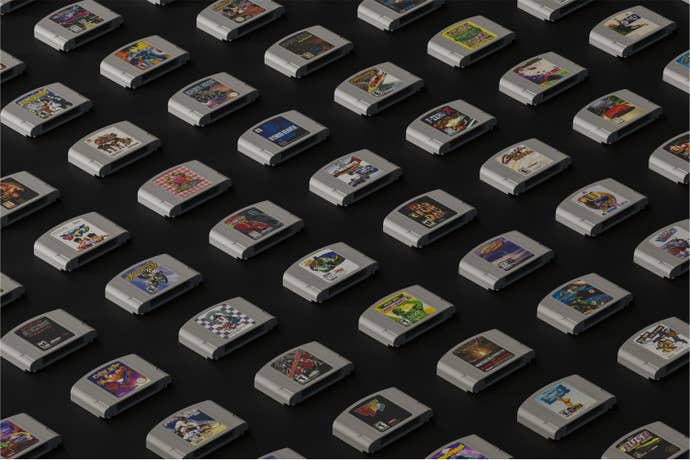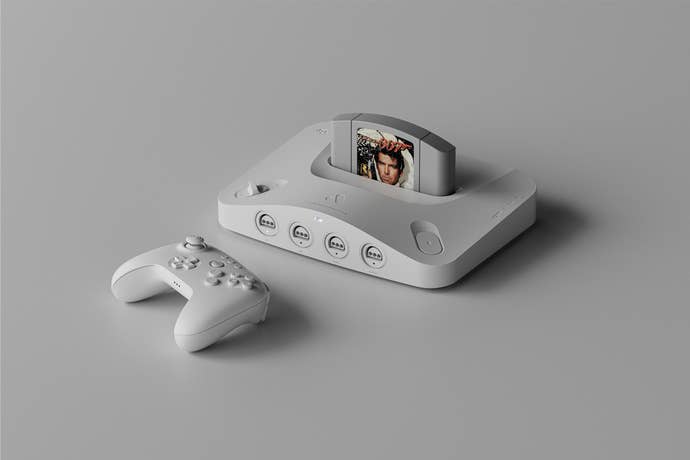Boutique retro gaming company Analogue has announced that the Analogue 3D, its latest console, will finally ship in Q1 of 2025 – and we also have our first ever images of the final console. Pre-orders will be live soon.
While retro revivals and special boxes are becoming ever more common and popular, Analogue remains one of the gold standards of the space. The way I’ve always explained it to people is this: while a lot of the other brands of emulation-focused retro fare is comparable to something like a record player you might pick up from Best Buy in the US or Argos in the UK, Analogue is the deeper, nerdier option. Sticking with the vinyl comparison, buying an Analogue machine is like ponying up for an expensive, old-fashioned record player and equally pricey speakers; it’s not for everyone, but for those in search of the purest experience, it’s one of the best options.
Analogue has previously released systems based on the NES, SNES, Mega Drive, Turbografx & PC Engine, plus a best-in-class handheld that plays the entire Game Boy library from the original through to the advance. Now it’s the N64’s turn – and now, one full year on from the machine’s announcement, Analogue 3D is ready for its debut.
Fans have been waiting for this moment for a while – Analogue has developed quite the following. For the uninitiated, two things set Analogue’s hardware apart.
The first is from the perspective of how games play. In software emulation, where an application is programmed to simulate the environment and systems of the console a game was designed for. This is what is commonly used in many of those Android or Raspberry Pi based emulation machines that are ten-a-penny, plus many more expensive options like the Polymega. Even services like Nintendo Switch Online and retro collections use software-based emulation – but the problem with this is that software emulation almost always contains small inaccuracies. N64 is a console that has been particularly famed for emulation issues.

In steps FPGA, the ‘Field Programmable Gate Array’. It’s more complicated, but the upside is this: rather than using software to pretend to be the original hardware, a circuit is carefully configured to exactly replicate the conditions of the chips and boards that each original machine had. FPGA isn’t Analogue’s ‘thing’ – several companies create consoles using themes – but Analogue was one of the early champions of the tech, using it in each of their retro revivals.
Analogue 3D features a 220k LE Altera Cyclone 10GX – which the company says is the most powerful it has ever used. After four years of development, Analogue boast that there’s 100% compatibility with every game from the N64 library from every release region. Chances are strong that flash carts will work too.
The second thing Analogue has going for it over rivals is, if I might venture an opinion in this news blast, the build quality. These are gorgeous machines, beautifully engineered; if relatively cheap and multi-functional retro handhelds out of China are agreeable and perfectly functional run-about city cars, these things are gorgeous sporty showcases. I mean, just look at it. It’s beautiful.
The Analogue 3D packs some good utility into that lovely frame, too. It takes original N64 carts from any region, can accept 4 original N64 controllers, and is ultimately compatible with all of the various accessories that could plug into those controllers. On the rear of the machine there’s two USB ports, a USB-C port for power, a single HDMI output, and an SD card slot. That card slot is only for updating firmware and the like – this machine is designed for use with real carts, not side-loaded ROMs; it’s all legal and above board.

As well as simply playing the games, the Analogue 3D features different display modes – meaning it’ll be possible to play with various high-end filters that aim to faithfully reproduce the original look of N64 games on CRT displays. These ealy games often look better with and were unquestionably designed for the natural fuzziness of the era they hail from – and so Analogue has systems to replicate that. We all know about rubbish vaseline filters in emulation, but if these are anything like those featured on the Analogue Pocket, they should be an impressive cut above those.
Settings like these as well as things like save states and the like are all managed via Analogue’s proprietary operating system, which comes in a new form here as ‘3D OS’. This features N64-specific features, and is again supposed to be the most advanced offering yet – though sadly this doesn’t support openFPGA, which means no custom fan-made software offerings, unlike the Pocket.
All this will come in at $250 without a controller. If you need a compatible pad, Analogue has again partnered with 8BitDo for an N64-themed input, which will run $40 – but you can use all of your original N64 controllers, if Mario Party’s palm-wrecking spinning mini-games haven’t burned out the sticks by now.
Anyway, it all seems rather exciting and rather good. Exactly how the package tallies will be discovered in the first quarter of 2025 – when the machine ships. Pre-orders open next week, on October 21st, at 8am Pacific Time. As always, the machine will exclusively be sold through Analogue’s website.